Contemporary Management Assignment: Reflection On Learning Experiences
Question
Task:
Students will need to maintain a diary of reflections on your learning experiences during the semester. You will then be required to collate these reflections into an integrated report on contemporary management assignment (3000 words) that utilises theoretical concepts to analyse and interpret what you have learned about yourself and others, and the implications for your future career. The reflection should also incorporate a key management challenge that you have witnessed or in which you have been involved. Critically reflect on how you could have addressed this problem/s as a manager using the soft and hard skills that you have examined in this subject.
Answer
Executive Summary
This contemporary management assignment involves my skills as an HR recruiter in an event management company as a part of the hospitality industry. This study is a reflection on my abilities, limitations, and ways to resolve them using various reflective theories and models. It also includes the critical analysis of that event company's management, human resources, and sales departments in particular. Both company's and my, the learner's performance has been reviewed in an impartial manner with the aid of suitable management theories and referencing. Appropriate conclusions and recommendations have been drawn by the application of my analytical and reasoning capabilities.
1. Introduction
1.1 Background
Reflective thinking can be defined as the abstract process of forming a judgment based on pre-acquired knowledge and analysis deduced from it. According to Kim & Silver (2016), reflective thinking is an inherent part of the entire critical thinking method wherein a learner actively forms a notion or belief after weighing all the possible logical considerations available.
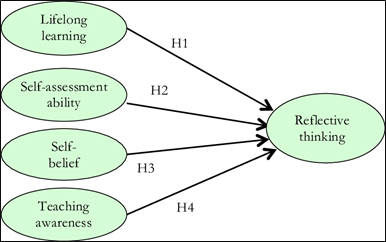
Figure: Key aspects of the reflective thought process
(Source: Kim & Silver, 2016)
Reflective thinking is done consciously with full knowledge of both grassroots and upper levels of the subject involved and it is essentially a self-learning journey where the learner draws from his/her own practical experience with encompassing awareness to evaluate those same experiences from a critical perspective (Nazari, Bahadorani & Tabesh, 2018). It consists of four key points-
- Present situation- It comprises of the current circumstances the subject matter is in, may include the learner himself/herself. In case the learner is holding a specific designation, this point should contain the present environment and management of that post, its critical analysis with respect to the structure of managerial and human resources, and the limitations.
- Past scenario- It consists of the previous environment of the same subject matter and how it changed or adapted itself with time and situation. If the learner is holding any post in a company, and the company itself is the subject matter then, the past working conditions of the learner and the work type and quality delivered by the learner himself/herself must be taken into account.
- Experience- The experience of the learner in accordance with the subject matter is all-important to help in building a reflective thought process. This experience itself acts a the most-rewarding practical knowledge that is crucial to any reflective thinking.
- Learning- This is the final stage where a learner accumulates all his/her theoretical and practical knowledge and experiences to formulate a well-developed analysis and come to a conclusion and assess the limitations of the subject matter and the learner himself/herself.
- To observe and analyze the present scenario of my designation, its scopes, and challenges
- To investigate the previous working conditions of my designation and how it has been modified with the time
- To introspect the strengths and problems revolving around the management of the company and how it can be resolved
- To infer my limitations and positives, and formulate thinking to enhance those strengths and minimize the weaknesses
This case study involves an event management company where I, the learner am employed as an HR recruiter and designated as a subordinate-staff. As I am scheduled to leave the company next week, the management has asked me to provide thoroughly detailed feedback based on my experiences with the company, its operation, and management.
1.2 Aim
The aim of these reflective study are as follows-
1.3 Scopes and limitations
Owing to my involvement in the HR department of the event management company for 7months at the lowest level, I have had grassroots experience and knowledge to draw from for the critical analysis of the importance of HR function in that company, the role that HR plays in the concerned firm, and the role it should play. Also, the prospect of the company with the past and present working environment and its relation with HR can be explored drawn from my own workspace encounters. Since it is a service-based company instead of a product, I can critically inspect the significance of HR in the escalation of sales. The financial management aspect that has not been discussed in this case study because of the lack of my knowledge and experience in this regard. My tenure of 7months as an HR personnel is not of sufficient duration to take on the financial management of the company for any analysis and deduction.
2. Reflective Findings
2.1 Assessing current condition
According to Gibb’s reflective cycle, assessment of experiences, conditions, and feelings are all equally important for an absence of any one of them will allow the problems to repeat itself over and over again in cyclic nature. This theory of reflective thinking also states that the cyclic nature of the experiencing conditions when assessed correctly allows a learner to observe, learn, apply, and recover (STRAUGHAN et al., 2018).
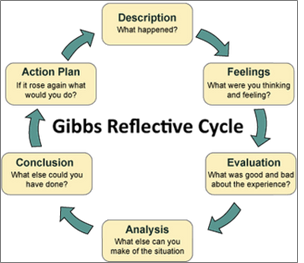
Figure: Stages of the Gibbs Reflective Cycle
(Source: STRAUGHAN et al., 2018)
When I started the company as an unpaid intern, I was extremely excited and nervous about my abilities, and the opportunities and challenges I have been present with. At the start of the first week, I was being supported by the senior HR managerial executives to understand the situation and the circumstances of the running of an event management company and the implications and impact of HR function on the service provided to the customers. By the end of one month, a subtle pattern of disparity between inter-personal employee relations started to form as a background picture and it is then, I realised as a learner that the role of HR management is an absolute necessity to establish the workplace discipline and how it can affect the performance of an individual and a group in a service major company like this one (Kayl et al., 2017). The employee grievance is another issue that I observed has been neglected frequently during my 7months tenure.
As a sub-ordinate HR, my core responsibilities after one month of internship included the allocation of the different event segments to 20 different event coordinators. In order to achieve that I had to get accustomed to the various styles of work event organizing of the 20 individual coordinators and I had to analyse their strengths and weaknesses. I was provided with numerous pictures, video and document samples of those coordinators to aid my work distribution understanding and execution. But the problems lied in the fact that the time-window I was provided for the introspection of abilities and flaws of each individual coordinators for whom I was accountable for was exceedingly small. It stunted my in-depth knowledge about those event coordinators and I made a fair-few mistakes of assigning several contents to the wrong coordinators and that resulted in a lot re-work.
After 5 months, I was assigned to the task of the selection process of hiring the event coordinators where my primary role was to scrutinize the applications submitted for the job to find the suitable eligibility criteria appropriate for the company’s need and the services it offers. Soon, I found out that I had to go through 200 applications per day and make appointments the suitable candidates over telephonic calls each day. Again, the extreme short duration intervened with my efficiency and led to a few incorrect selections which was found out in the late stage of recruitment interview. With time as I became adjusted with the process, the number of applications increased to 350 which led to work overtime and I had to go through the applications even when I reached home. This in turn resulted affected my performance negatively after a certain while.
As my workload increased with highly accelerated volume, my expectations for performance appraisals also ascended which was following the natural order psychology as stated in the expectancy theory (Lee, 2019). Unfortunately, no increment or incentives was ever offered as a performance appraisal which left me demotivated and in self-doubt thereby, negatively altering my work output and work efficiency. Though, my HR supervisor observed this and tried to communicate with me to resolve my state and evenly distribute the workload, it was never reciprocated from the higher authorities who are the only one entitled to make any decisions. This also reflected the lack of independence on HR system as a whole and highlighted the hierarchy system as sourced from the Maslow’s hierarchy theory (Rao, Kulshrestha & Ramakrishnan,2019). I also noticed that the better coordinators I used to allocate managing of the important event segments to were never offered any incentives either and during my tenure two of them left to join the rival company.
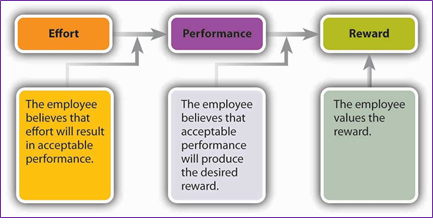
Figure: The basics of expectancy theory
(Source: Lee, 2019)
2.2 Investigating the past conditions
A chance remark of my senior colleague that the working environment has improved since the past two years aroused my managerial learning curiosity when I complained about zero performance incentives being provided. After this I decided to investigate the previous working conditions in this web-developing company to get a grasp of change in the operational management before starting to form an analytical reflective thought process. Upon further investigation I found out that in the previous year, a trained HR who has worked for over 4months in the company was given 500 applications per day to process and arrange necessary appointments, and it also came to my knowledge that the salaries were almost half of what I and others of my official status get now. The working hours too were an additional 2hours longer, and the another of my senior executive pointed out that barred the higher officials in the management nobody gets performance incentives until at least two years tenure is complete. The event bidders employed by the company who bring in the clients to the sales table are not offered increased remuneration even if when they perform exceptionally well.
When I compared the previous scenario of mine and other lower and medium level designations of the company, I realised that a lot has changed and though the HR management is yet to achieve their HR objectives effectively, it has certainly adapted the right way to travel. Upon further analytical comparison, I perceived the fact that due to the changes made in the structure and running of the management and reshuffling of the workload distribution, the performance of the senior members has been enhanced by a large extent especially, the executive HR recruiters and the senior bidders. However, the working condition of the top-notch senior event coordinators have not changed much.
2.3 Introspecting the strengths and weaknesses of the management
In service-based company like this event management firm I work at, the management must realise that the service-providers themselves are the products and the event along with its organization are just the packaging and the HR function becomes all the more significant and inter-related to sales than a product-based firm (Troth & Guest, 2020). To satisfy the clients successfully and to maintain that consistency, the retention of the top-performing and dedicated employees is no else important than the recruitment of the suitable candidates (De Clercq, Haq & Azeem, 2019). Below I have discussed the prime strengths and weaknesses of the management after a critical reflective thinking.
The main strength or positive aspect of the HR management of this company is its effective selection and recruitment process. It is by this method that even after not meeting the optimum work environment for maximum performance, the company has been able to survive and flourish. The executive managers seem to be well-aware of HHRM model and possess excellent hard skills like highly accredited degrees, top-notch monetary negotiations with the clients, commission-related issues with the bidders, etc. However, the soft skills and SHRM model is still undervalued in this company and as a result the HR management has been quite unsuccessful in retaining the experienced and very skilled performers which has directly impacted on the customer satisfaction from the quality of the services delivered (Tomcikova, et al., 2018).
According to the four F’s of active reviewing reflective theory, there are four pillars of reflection for managerial success- (i) Facts, (ii) Feelings, (iii) Findings, and (iv) Future (Koukpaki & Adams, 2020). If I would have been at a managerial position in the company, I would have applied this reflection theory to analyse the shortcomings of the HR function in this company and adapted accordingly. For example, in my fourth month of employment in the company, two senior bidders were vying for the only appraisal and promotion announced by both the sales and HR department and it resulted in an acute competition where inter-personal relation of the concerned bidding group was hampered and the discipline was disrupted. Interestingly, the bidder who was the guilty party was given promotion without any proper HR investigation as his presentation of the facts were more eloquent and articulate than his professional rival.
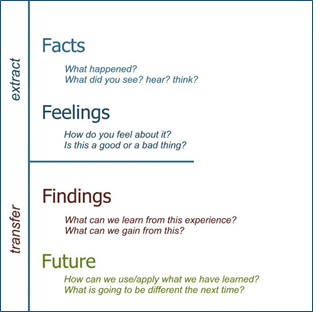
Figure: The main steps of Four F reflective theory
(Source: Koukpaki & Adams, 2020)
If I had been the manager, I would have held the promotion for a while and gradually, investigated the facts from all the employees involved and even enquired the lower-level staffs like sweepers and peons who have no involvement but listen a lot and hence, are able to give an impartial account of the unpleasantness. Then, I would have tried to understand the feelings of the employees and the two bidders as stated in the psychological behaviour theory of management in order to analyse the foundation of the altercations involved (ALMULHIM, 2020). After that, I would have deduced my own findings and taken an impartial decision and acted on it for the better of the company’s financial and managerial future.
2.4 Analysing my limitations and reflecting on the ways to optimize my abilities
Like any other trainee and intern, I was involved in the process of hard and long duration working hours which I seem to unable to cope up with at first. But with time, my improvement was noteworthy even to the management particularly my supervisor. The same thing happened when my roles and responsibilities were shifted to the selection procedure. Upon reflecting I realised though I excel at my role after a certain passing of time, I do not seem to be able to understand the duties immediately and with equal efficiency like me peers and this I think is one of the biggest limitations. To minimize my shortcomings, I believe I should apply the theory of the integrated reflective cycle which states that after reflection on the action, a learner should prepare himself/herself for the future advents and experiences (Leering, 2017).
|
Steps |
Things need to be done |
|
Experience |
I must think back on my experiences and evaluate every little detail of my feelings towards the experiences of shift in professional roles in their entirety. |
|
Reflection on Action |
I must reflect on my performance as a fresher in every change of role and analyse my performance impartially. I must also think about the reasons behind my inadequacies in grasping the subject matter immediately. I can also assume the negative implications of this lack of efficiency on my career prospects. |
|
Theory |
I must scrutinize my shortcomings from an HR perspective where I am recruiter hiring a person with efficiencies and shortcomings similar to me and the impartially judge my capabilities and conclude whether I would to hire a person like myself or not from strictly business and managerial perspectives. |
|
Preparation |
I must prepare myself by attending the HR managerial workshops where the issues like immediate readiness are addressed and taught in professional manner. Also, in these workshops I can relate myself to other people similar in this aspect, and listen and analyse their feelings, logics, solutions. |
Table 1: Depicting the application of integrated reflective cycle theory
(Source: Learner)
One of my better capabilities is to organize and conduct the group meetings in an orderly and efficient manner and after one such meeting in my sixth month of employment in this company I realised that when a major argumentative situation occurs under great competitive duress, I am unable to manage the discipline by containing the situation as mentioned in the contingency theory of HR management (McGrandle, 2017). I have reflected and applied the Gibb’s reflective cycle to prepare myself for these situational managerial abilities (Markkanen et al., 2020).
|
Stages |
Plan |
Timeline |
|
Description |
Five event coordinators were arguing about the distribution of workload and the two groups were formed. Each group wanted to have the easier task as no performance incentives were involved. |
Day 0 |
|
Feelings |
I as the meeting conductor and mediator felt that all five of them where trying to shift the more laborious and difficult tasks on each other to lighten their own workload. |
Day 0 |
|
Evaluation |
My evaluation of the situation highlighted my own inadequacy to step-up as a situational team-leader and to restore the office-discipline. It also brought to light the need of performance-based incentives to engage the employees. |
Day 2 |
|
Analysis |
According to my analysis, the situation could have been averted if I had handled the key points of the meeting differently. |
Day 5 |
|
Conclusion |
I could have finalised the distribution of the workload for the next two days before asking for writers’ opinion on the subject and emphasised on the fact that my decision should be considered final on this subject in my team. I could have conveyed my senior HR team about the growing restlessness and demotivation among the writers due to lack of increments. |
Day 5 |
|
Action plan |
I enrolled myself into 4 managerial seminars since the incident to learn, understand and apply the concept of situational leadership with utmost efficiency. |
Day 15 |
Table 1: Depicting the application of Gibb’s reflective cycle
(Source: Learner)
3. Conclusion
It can be concluded that my skills and understanding as learner of contemporary management has improved extensively from this practical grassroot experience of working for 7months in a low-level HR position at an event management company. It can also be inferred that my analytical and reasoning abilities required to enhance my future careers prospects have been enhanced significantly by the work designations the company management has thrusted and entrusted upon me. It can also be deduced the without appropriate working conditions, like performance-based incentives and a healthy distribution of workload to achieve the optimum work and personal space balance, the management cannot retain the skilled performers in the company for more than two years (De Stefano et al., 2018).
3.1 Recommendations
It can be recommended to the HR management of the event company for providing a better training method to engage all the interns equally, and to provide a wider time-window for the unpaid fresher interns to adapt and adjust with the workload better. The company could have given performance-based increments for the better employees which in turn would motivate HR personnel like me to produce better performances both from myself and my event-coordinators.
For myself, I would recommend further enhancement for communication capabilities to cope with any and every situation with immediate effect and efficiency by analysing my strengths and weaknesses and consistently working to optimize them.
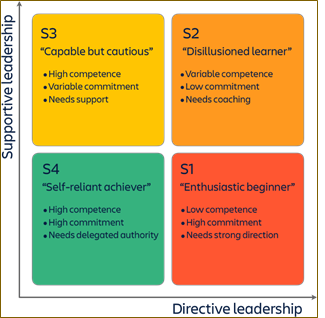
Figure: Different managerial vectors recommended for the learner
(Source: McGrandle, 2017)
References
ALMULHIM, A. F. (2020). Linking Knowledge Sharing to Innovative Work Behaviour: The Role of Psychological Empowerment. The Journal of Asian Finance, Economics, and Business, 7(9), 549-560.
De Clercq, D., Haq, I. U., & Azeem, M. U. (2019). Dissatisfied employees, diminished helping: Using psychological capital to buffer the damaging effects of job dissatisfaction on helping behaviours. Journal of Management & Organization, 1-15.\
De Stefano, F., Bagdadli, S. & Camuffo, A., 2018. The HR role in corporate social responsibility and sustainability: A boundary?shifting literature review. Human Resource Management, 57(2), pp.549-566.
Kayl, I. I., Zudina, E. V., Epinina, V. S., Bakhracheva, Y. S., & Velikanov, V. V. (2017). Effective hr management as the most important condition of successful business administration. In Integration and Clustering for Sustainable Economic Growth (pp. 23-30). Springer, Cham.
Kim, Y., & Silver, R. E. (2016). Provoking reflective thinking in post observation conversations. Journal of Teacher Education, 67(3), 203-219.
Koukpaki, A. S. F., & Adams, K. (2020). Enhancing professional growth and the learning and development function through reflective practices: an autoethnographic narrative approach. European Journal of Training and Development.
Lee, H. W. (2019). Moderators of the motivational effects of performance management: A comprehensive exploration based on expectancy theory. Public Personnel Management, 48(1), 27-55.
Leering, M. M. (2017). Integrated reflective practice: A critical imperative for enhancing legal education and professionalism. Can. B. Rev., 95, 47.
Markkanen, P., Välimäki, M., Anttila, M., & Kuuskorpi, M. (2020). A reflective cycle: Understanding challenging situations in a school setting. Educational Research, 62(1), 46-62.
McGrandle, J. (2017). Understanding diversity management in the public sector: A case for contingency theory. International Journal of Public Administration, 40(6), 526-537.
Nazari, R., Bahadorani, S., & Tabesh, S. (2018). The Effect of Reflective Thinking on Management Style, Functional Agility and Organizational Efficiency in Sport Managers. New Trends in Sport Management, 6(22), 25-36.
Rao, A. L., Kulshrestha, N., & Ramakrishnan, G. (2019). Adaptability and applicability of need hierarchy theory in assessing employee satisfaction with special reference to EPC company of UAE. International Journal of Business Excellence, 19(1), 1-15.
STRAUGHAN, P. T., TAY, W. Y. Z. W., SONG, E. K. E., & KOH, L. B. A. (2018). Assessing student learning in sport event management through reflective practice: Measure of success in co-curricular learning in higher education.
TOM?ÍKOVÁ, ?., GALLO, P. & GALLO Jr, P., 2018. Analytical view of recruitment and selection of employees as one of the most important practices of human resorce management. Performance of companies that are affected by globalization operating in Slovakia. Editorial Board, 12(8), p.54.
Troth, A. C., & Guest, D. E. (2020). The case for psychology in human resource management research. Human Resource Management Journal, 30(1), 34-48.












